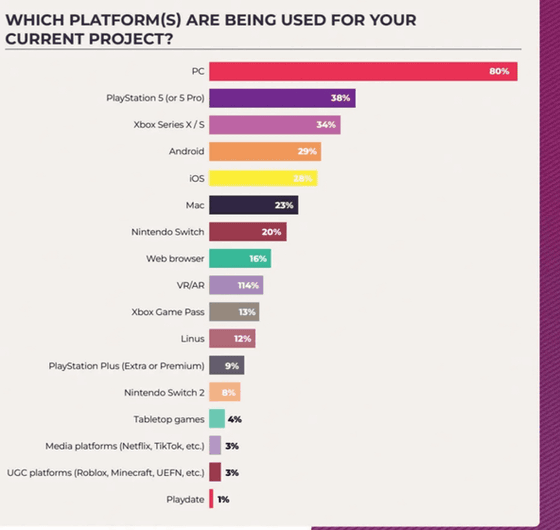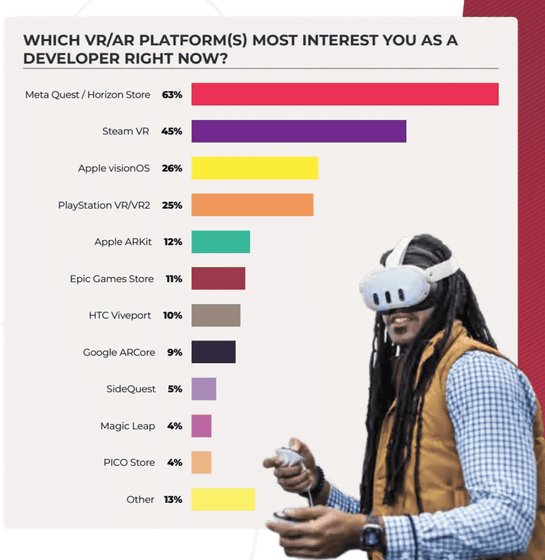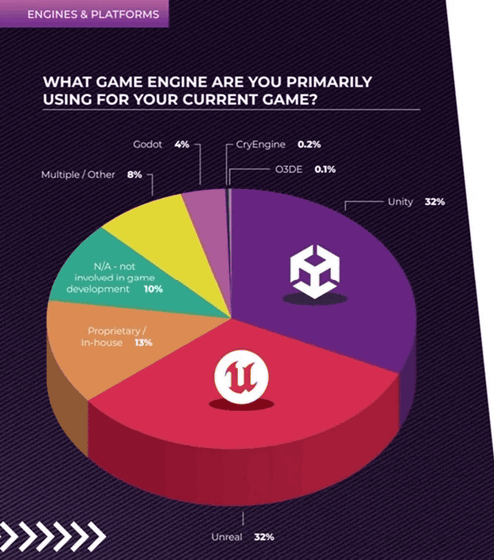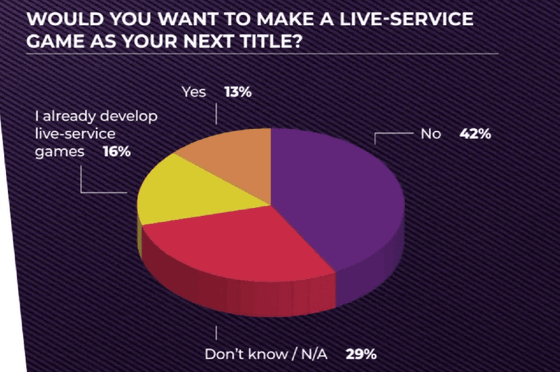The 2025 GDC State of the Game Industry, a survey of over 3,000 game developers, reveals the latest developments in the game industry, with 11% of respondents having been fired in the past year and 30% saying that generative AI is having a negative impact on the industry.

The game developers conference
2025 GDC State of the Game Industry report.pdf
(PDF file) https://www.dropbox.com/scl/fo/pel5295n7j0on8zscomjh/AOD5vfOYYtl1gBNMKWECKVw/2025%20GDC%20State%20of%20the%20Game%20Industry%20report.pdf
The 2025 Game Industry Survey Reveals Increasing Impact Of Layoffs, Concerns With The Usage Of Generative AI, Funding Challenges and More | Business Wire
https://www.businesswire.com/news/home/20250121745145/en/
GDC survey reveals a rocky year of layoffs and AI skepticism for game developers | VentureBeat
https://venturebeat.com/games/gdc-survey-reveals-a-rocky-year-of-layoffs-and-ai-skepticism-for-game-developers/
GDC's annual State of the Game Industry survey reveals 1/3 of 'triple-A developers' are working on live service games | PC Gamer
https://www.pcgamer.com/gaming-industry/gdcs-annual-state-of-the-game-industry-survey-reveals-1-3-of-triple-a-developers-are-working-on-live-service-games/
According to the GDC report, 11% of respondents reported being laid off by a game company in the past year. The layoff rate in the 2024 report was '7%.' In addition, 41% of respondents said that 'staff cuts have affected the company,' 29% reported that a colleague they were involved with was laid off, and 18% reported that a developer on another team was laid off. In addition, 4% of respondents said that 'the game company they worked for went out of business.' Narrative developers were the most affected, with 19% of respondents being laid off.
Beth Elderkin, content marketing manager at GDC, explained, 'When we asked developers what concerns they had about future job cuts, the numbers didn't change significantly. 58% said they had some concerns about job security, which is roughly the same as last year. 'One new thing we did this year was ask developers why they were fired by their company. The most common explanation given by the company was 'restructuring' (22%), followed by 'reduced revenue' (18%) and 'market or industry changes' (15%). And 19% of developers said they were not given a reason by their company.' In addition, the number of developers who said they were not concerned about job cuts decreased by 5% from the previous year to 30%.

Additionally, 58% of respondents support the formation of labor unions in the games industry, with only 10% saying they are against unionization. Additionally, 31% of developers said they 'probably should' or 'don't know' about unionization, which is roughly the same as last year's report.
Furthermore, 22% of respondents answered that they had discussed forming a labor union within their company within the past 12 months. In addition, of those who had discussed forming a labor union, 29% said their company supported unionization, 19% were undecided, and 12% said their company was opposed to unionization.
Nearly all respondents were in favor of unionization, saying it would improve working conditions, reduce backlogs, and advocate for marginalized developers. Respondents who were against unionization said it would hurt indie game studios, stifle creativity, and force companies to close or move overseas.
The table below summarizes the 'weekly work hours' of the respondents. The most common answer was '21-40 hours a week,' but it is clear that 79% of game developers work more than 40 hours a week (8 hours a day x 5 days). According to GDC, the number of weekly work hours has been decreasing in recent years, but this year's report shows a clear increase, which they speculate is due to 'fears of staff cuts.'

Additionally, 52% of respondents said they work for a company that uses generative AI, and 36% said they personally use generative AI. Business and finance staff are particularly likely to use AI tools (51%), followed by production and team leads (41%) and marketing (39%). Older staff are more likely to use AI tools than younger people, with 47% of respondents aged 55 and over using AI tools. By comparison, only 28% of respondents aged 18-34 use AI tools.
On the other hand, 30% of respondents said that generative AI is having a negative impact on the gaming industry, a significant increase from 12% last year. The main reasons game developers are dissatisfied with generative AI include 'intellectual property theft,' 'energy consumption,' 'poor quality of generative AI content,' 'potential bias in AI,' and 'regulatory issues.'
Below is a summary of responses to the question of which platform they are developing games for. PC was the most popular at 80%, which is a significant increase from the previous year's 66%. Other popular platforms were PlayStation 5 (PS5) at 38%, Xbox Series X/S at 34%, Android at 29%, and iOS at 28%. Browser games are also becoming more popular, recording the highest figure in the past 10 years at 16%.

Looking specifically at VR/AR games, the most popular platform is Meta's Quest and Horizon Store (63%), followed by Steam VR (45%), Apple visionOS (26%), PlayStation VR/VR2 (25%), Apple ARKit (12%), and Epic Games Store (11%).

The most popular game engines used for game development are Unity and Unreal Engine, both at 32%. The option of developing your own game engine (13%) is also still very much in vogue. Unity suddenly revised its prices, angering many developers, but it seems that developers are not leaving Unity, perhaps due to the impact of the immediate revision .

Furthermore, 16% of respondents said they were working on developing live service games (games that continuously add content and generate revenue), and 13% said they were interested in developing them. However, 42% said they were not interested, and 29% said they did not know. Developers' opinions of live service games vary, with some developers positively viewing the 'economic and community-building benefits,' while others are concerned about risks such as 'declining player interest,' 'creative stagnation,' 'predatory behavior,' 'charging,' and 'burnout.'

in Game, Posted by logu_ii